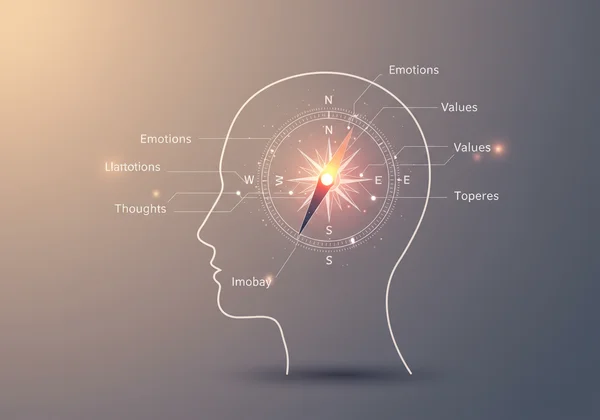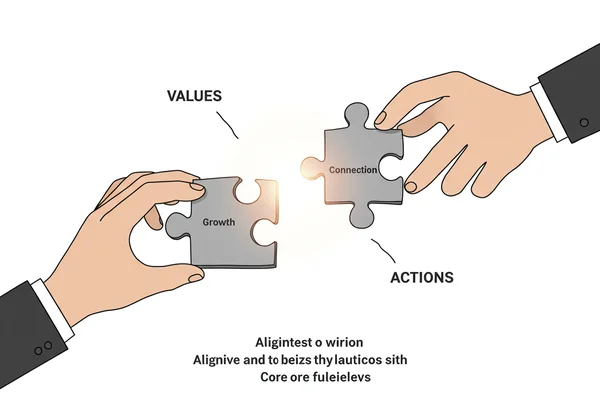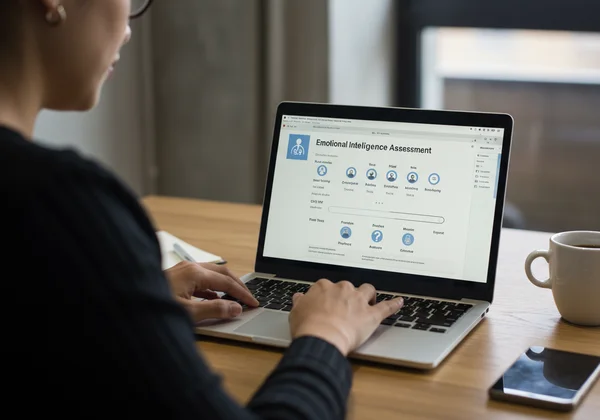Improve Emotional Intelligence: Self-Awareness Exercises to Boost Your EQ
November 13, 2025 | By Phoebe Chandler
Feeling like you're on autopilot, driven by misunderstood emotions? Your true potential is unlocked by understanding your inner world—the essence of self-awareness and the cornerstone of emotional intelligence (EQ). Asking how to improve self-awareness? is the first step toward personal growth. This guide provides practical exercises to cultivate this critical skill, turning introspection into a powerful tool. A great starting point is getting a baseline with a free EQ assessment.
Understanding Self-Awareness: The Core of Your Emotional Intelligence
Self-awareness is more than labeling emotions; it's a deep understanding of your feelings, strengths, weaknesses, and motivations. It’s the ability to see yourself clearly, recognizing how your emotions affect your thoughts and actions. This internal guidance system is essential for navigating your personal and professional life.
What Exactly is Self-Awareness? Defining the Inner Compass
Self-awareness is the ability to monitor your inner world with clarity. It’s your inner compass, providing constant feedback on your emotional state, thoughts, and physical responses. A self-aware person identifies their feelings as they happen and understands what triggered them. This clarity allows for conscious choices over subconscious reactions.

Why Self-Awareness Powers All Other EQ Skills and Personal Growth
Self-awareness is the foundation of all other EQ skills. You can't manage emotions you don't recognize (self-regulation). You can't understand others' feelings if you're disconnected from your own (empathy). Effective relationships depend on understanding your impact on others. Developing self-awareness unlocks your capacity for all these skills, paving the way for lasting personal growth.
Practical Self-Awareness Exercises to Cultivate Deeper Understanding
Developing self-awareness is an active practice requiring consistent effort. These simple yet powerful exercises will help you build this crucial skill. Start with one or two that resonate and incorporate them into your daily routine.
Exercise 1: The Power of Journaling for Emotional Reflection
Journaling is a powerful tool for emotional clarity. Don't just recount your day; use it for focused emotional reflection. Each evening, take 10 minutes to answer:
-
What was one moment today where I felt a strong positive emotion? What caused it?
-
What was one moment where I felt a strong negative emotion? What was the trigger?
-
How did my emotions influence my actions or decisions today? This practice helps you connect the dots between events, feelings, and behaviors, creating a rich map of your emotional patterns.

Exercise 2: Mindful Breathing & Body Scans for Present Moment Awareness
Your body often registers emotions first through physical signals like a racing heart or tight jaw. Mindful breathing helps you tune into these cues. Find a quiet place, close your eyes, and focus on your breath for two minutes. Follow this with a "body scan," mentally checking each part of your body for tension without judgment. This practice grounds you in the present and strengthens the mind-body connection.
Exercise 3: The "Emotional Check-in" Practice: Naming Your Feelings
Set reminders throughout your day for an emotional check-in. Ask yourself, "What am I feeling right now?" Be specific—instead of "bad," try "frustrated," "anxious," or "overwhelmed." Expanding your emotional vocabulary provides a more precise understanding and can reduce an emotion's intensity. This simple act gives you a sense of control. For a comprehensive view of your emotional strengths, test your EQ.
Exercise 4: Seeking Constructive Feedback to Know Yourself Better
Our self-perception isn't always accurate; we all have blind spots. One of the bravest and most effective ways to build self-awareness is by seeking constructive feedback. Approach a trusted friend, family member, or colleague and ask specific questions like, "In our last project meeting, how did my communication come across?" or "When I'm stressed, what changes do you notice in my behavior?" Listen with an open mind, thank them for their honesty, and reflect on the insights you gain.
Advanced Techniques to Truly Know Yourself Better
Once you've mastered the foundational practices, you can delve deeper into the nuances of your personality and emotional landscape. These advanced techniques help you uncover the underlying patterns and beliefs that shape who you are, allowing you to know yourself better on a profound level.
Exercise 5: Identifying Your Emotional Triggers and Patterns
An emotional trigger is anything that sets off an immediate and intense emotional reaction. It could be a specific phrase, a particular situation, or even a tone of voice. Start by identifying situations where you consistently overreact. Work backward to pinpoint the exact trigger. Once you know your emotional triggers, you can anticipate them and choose a more measured response. Recognizing these patterns is a huge leap in self-mastery and is a key area an emotional intelligence test can help illuminate.
Exercise 6: Values Clarification: Aligning Actions with Core Beliefs
A significant source of internal conflict and stress comes from a misalignment between your actions and your core beliefs. Take time to identify your top five personal values (e.g., integrity, connection, growth, security, creativity). Then, look at how you spend your time and energy each week. Are your daily actions in harmony with what you claim to value most? This exercise provides incredible clarity and helps you make choices that lead to a more authentic and fulfilling life.

Exercise 7: Role-Playing & Visualization for Emotional Preparation
Self-awareness isn't just about understanding past reactions; it's also about preparing for future challenges. If you have a difficult conversation or a high-stakes presentation coming up, use visualization to mentally rehearse it. Imagine the scene in detail, anticipating your potential emotional responses. You can even role-play the scenario with a trusted friend. This proactive approach prepares you to handle difficult emotions with grace and intention, rather than being caught off guard.
Disclaimer: The information and tools provided on this website, including the Emotional Intelligence Test, are for educational and self-improvement purposes only. They are not intended to be a substitute for professional psychological, psychiatric, or medical advice, diagnosis, or treatment.
Your Journey to Greater Emotional Intelligence Starts Here
Mastering self-awareness is not a one-time event; it is a continuous journey of discovery. By consistently practicing these exercises, you build the mental and emotional muscles needed to navigate life with greater clarity, purpose, and resilience. Each step you take to understand your inner world is a step toward becoming a more effective leader, a more empathetic partner, and a more fulfilled individual.
Your journey of improvement starts with a single, crucial step: understanding where you are right now. An objective assessment can provide the personalized insights you need to focus your efforts effectively. Ready to begin? Discover your emotional intelligence by taking our free, science-inspired test today.

Frequently Asked Questions About Self-Awareness & EQ Improvement
What is self-awareness in emotional intelligence?
Self-awareness is the foundational component of emotional intelligence. It is the ability to accurately recognize and understand your own emotions, thoughts, and values, and to see how they impact your behavior and the people around you. It's about having a clear perception of your personality, including your strengths, weaknesses, motivations, and beliefs.
How quickly can I expect to improve my self-awareness?
Improvement in self-awareness is a gradual process that depends on your consistency and commitment. While you may notice small insights within days of starting practices like journaling, significant and lasting change often takes weeks or months of dedicated effort. Be patient and compassionate with yourself; the goal is progress, not perfection.
Is there a specific test to measure self-awareness?
While self-awareness itself is introspective, a comprehensive emotional intelligence test is an excellent tool for measurement. Such assessments evaluate the key components of EQ, including self-awareness, by presenting you with situational questions. The results provide a structured snapshot of your emotional strengths and identify specific areas where you can focus your development efforts.
Why is self-awareness considered the most foundational EQ component?
Self-awareness is considered the cornerstone of EQ because all other emotional intelligence skills depend on it. You cannot effectively manage your emotions (self-regulation) if you don't recognize them first. You can't fully understand others' feelings (empathy) if you are out of touch with your own. Building strong relationships (social skills) also requires understanding how your behavior affects others, which stems directly from self-awareness.